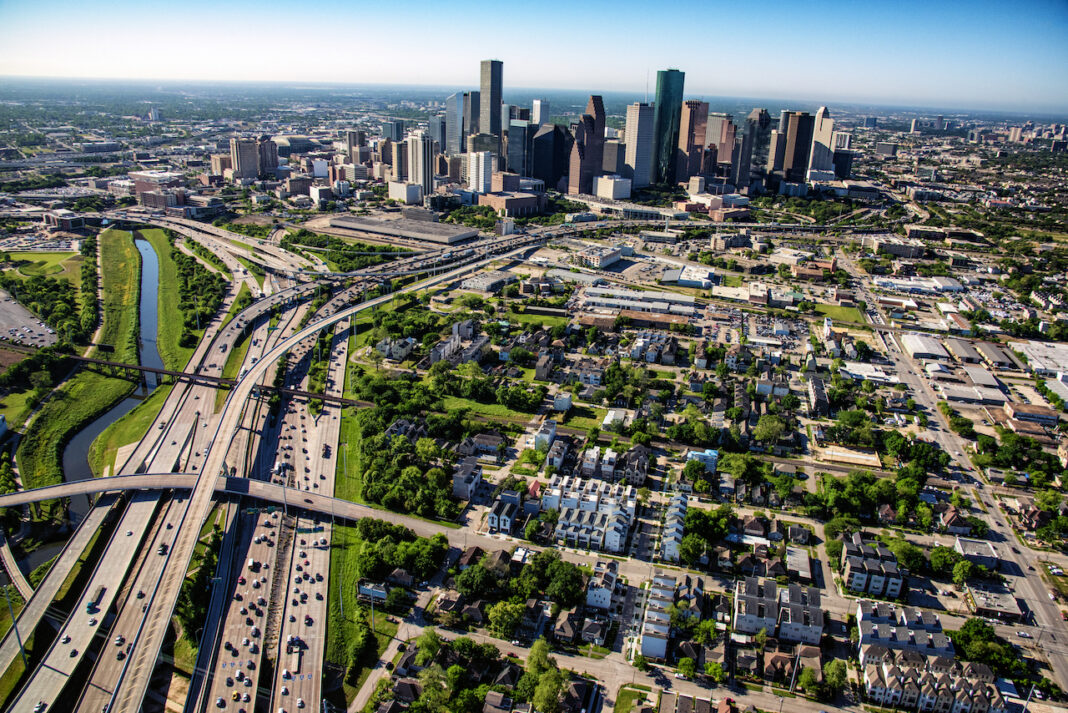
Within its sprawling 627 square miles, Houston is a lively city and a great place to live, with a thriving job market, an impressive food scene, an affordable cost of living, and plenty to do. However, like any city, there are pros and cons to living in Houston. In this article, we will explore both the advantages and disadvantages of living in Houston to help you make an informed decision.
What to know before moving to Houston
Before moving to Houston as a renter, consider the following key aspects to ensure a smooth transition:
- Neighborhoods and commute: Research different neighborhoods in Houston to find the one that best fits your lifestyle and preferences. Consider factors such as proximity to work, public transportation options, schools, and amenities. Houston is a sprawling city, so understanding the commute times and traffic patterns is crucial.
- Cost of living: Evaluate the overall cost of living in Houston, including rent, utilities, groceries, and transportation. Houston generally has a lower cost of living compared to other major U.S. cities, but it’s essential to budget accordingly.
- Climate: Houston has a humid subtropical climate, with hot and humid summers. Be prepared for the weather and consider factors like air conditioning when looking for rental properties. Additionally, be aware of the hurricane season and take necessary precautions.
- Job market: Houston is known for its strong job market, especially in industries such as energy, healthcare, and aerospace. Research employment opportunities in your field before moving and make sure there are job prospects that align with your career goals.
- Flood risk: Parts of Houston are prone to flooding, so it’s important to check if the rental property is located in a flood-prone area. Understanding the flood risk and having renter’s insurance that covers flood damage is advisable.
- Cultural diversity: Houston is one of the most diverse cities in the United States. Embrace and appreciate the cultural diversity, and explore the various cultural events, festivals, and culinary experiences the city has to offer.
- Healthcare and education: Check the availability and quality of healthcare facilities in the area, as well as the reputation of nearby schools if you have children. Access to good healthcare and education is essential for a comfortable living experience.
- Public services and utilities: Familiarize yourself with local public services, utility providers, and emergency services. Know how to contact them and understand the local regulations regarding utilities and waste disposal.
- Renter’s rights: Understand your rights and responsibilities as a renter in Texas. Familiarize yourself with the lease agreement, including terms related to rent, maintenance, and any additional fees.
- Community and social life: Explore the local community and social scene. Houston offers a wide range of entertainment options, parks, cultural institutions, and recreational activities. Getting involved in the community can enhance your overall living experience.
By thoroughly researching these aspects, you’ll be better prepared for your move to Houston and can make informed decisions about where to live and how to navigate daily life in the city.
Read on and see if Houston is an ideal city for you by evaluating these 9 pros and cons of living in Houston:
What are the pros of living in Houston?
- Thriving job market
- Cultural diversity
- Many entertainment options
- Affordable cost of living
- Incredible cuisine
- Southern charm
What are the cons of living in Houston?
- Limited public transportation and heavy traffic
- High taxes
- Humid climate
Pro: Thriving job market
Oil and gas, aerospace, health care, and manufacturing are all major industries that keep the economy in Houston booming. You can expect to find a good amount of work available in the energy industry. The city is also home to the world’s largest medical complex, and those living in Houston are certainly proud of it.
Some of the top employers in Houston are AT&T, Dell Technologies, Oracle, CBRE Group, and American Airlines Group. According to the U.S. Bureau of Labor Statistics, the unemployment rate in the Houston area is 4.1%, which is only slightly higher than the national average. According to the U.S. Census Bureau, the median household income in Houston from 2016 to 2020 was $53,600.
Con: Transportation/Traffic

Like any sprawling metropolis, you might need a car to get around Houston. Be prepared to come across some traffic on the roadways. Based on data from AAA, the average gas price in Texas is $4.616 per gallon as of June 2022, slightly below the national average of $4.955 per gallon. According to Bankrate, the average annual cost of full-coverage car insurance in Texas is $1,823 per year.
The METRORail light rail system for downtown commuters and Park & Ride services for suburban dwellers make getting around easier. Having two major airports makes getting out of the city a breeze for both domestic and international travel. George H. Bush Intercontinental Airport (north of the city) is a United Airlines hub, and William P. Hobby International Airport serves as a hub for Southwest Airlines.
Pro: A city of many cultures

Houston is known for its vibrant, diverse culture. Census Bureau data shows that Houston houses a population of 2,288,250 people: 44.5% are Hispanic or Latino, 24.1% are white, 22.8% are Black or African American, 7% are mixed race, 6.9% are Asian, and 0.3% are American Indian or Alaska Native.
Cultural events abound in this diverse city, including celebrations such as Mardi Gras, Japan Festival, The Martin Luther King Grande Parade, and the Houston Italian Festival. Houston is also known for cultural cuisines like Tex-Mex, Louisiana Creole, Vietnamese and Viet-Cajun, Czech, and Southern barbecue.
Houston is a large city with many diverse neighborhoods, each with its own unique character and charm. From the artsy Montrose to the historic Heights, there is a neighborhood in Houston for everyone.
Pro: Things to do and entertainment

With its variety of sports teams, museums, and family-friendly activities, Houston always has something going on. Pro sports teams, including the Rockets (NBA), the Texans (NFL), and the Astros (MLB), all call Houston home. According to SeatGeek, the average cost of Texans tickets is $87, the average cost of Rockets tickets is $62, and the average cost of Astros tickets is $72. Overall, entertainment is pretty affordable in Houston based on the cost of living in the city.
If art and science are more your things, check out some of Houston’s numerous museums and theaters. The city’s relatively compact downtown area includes the Theater District, home to the renowned Houston Grand Opera. The Johnson Space Center, Downtown Aquarium, and the Houston Zoo are all great places for a day of family fun, too. Or, there’s always the beach!
Con: Taxes
Welcome to Texas, where there’s no state income tax. Although this sounds great in theory, it makes for higher sales taxes. Most purchases will carry an 8.25% sales tax, one of the higher sales taxes in the country.
While Texas also has no state property tax, homeowners still pay property tax to local units. According to SmartAsset, Texas residents pay some of the highest property taxes in the country. In Harris County, the average rate of property taxes is 1.940%. This is well above the national average of 1.07%. Based on a home value of $250,000, homeowners in Harris County pay an average of $4,850 per year in property taxes. Fortunately, by renting from a property owner, you can avoid paying these hefty fees.
Pro: Affordable cost of living
The cost of living in Houston is lower than the national average, overall. The median rental prices of 1 and 2-bedroom apartments are $1,300 and $1,610, respectively, making Houston cheaper to rent in than over 40 major U.S. cities. For a cheap night out on the town, Miller Outdoor Theatre hosts a range of free shows, including classical music, ballet, and Shakespeare. You could also visit Market Square Park to see free movie screenings.
Pro: Incredible food

Beloved restaurants in the East end neighborhood include Nancy’s Hustle, a welcoming bistro serving a mix of New American and European cuisine. You could also try El Tiempo Cantina, a lively, family-owned cantina cherished for its hearty Tex-Mex dishes.
Consider exploring Montrose, too, known for its artsy culture, food scene, and nightlife. Check out popular spots like Nobie’s, an intimate New American restaurant, or Uchi, an award-winning upscale Japanese eatery.
Con: Weather
You thought the “H” in H-town stood for Houston, but it actually stands for heat and humidity. It’s no joke, folks. The trade-off is that it’s not very cold at all in the winter months. Unfortunately, Houston’s gulf coast location leaves it prone to natural disasters. Hurricane season brings the threat of flooding, as we saw in August 2017 with Hurricane Harvey. In fact, the large, coastal city ranks among the most disaster-prone cities in the country. If you’re living in Houston, just make sure to buy flood insurance and have an emergency kit on hand.
Pro: The greenest city in the South
The Bayou City boasts over 50,000 acres of park space within the city limits. Memorial Park on Houston’s west side is home to hiking/running trails, and the Houston Arboretum, which is free to the public, is worth checking out. George Bush Park, located on the far west side of the city and situated entirely within Barker Reservoir, is Houston’s largest park.
If you’re into camping, Houston has some spots that may be perfect for you. For example, Huntsville State Park by Sam Houston National Forest, just an hour’s drive from the city center of Houston, is the setting of a scenic lake and 2,000 acres of pine woods. Throughout the park, you’ll find guided horseback trail rides, campgrounds, and hiking trails.
Frequently asked questions about living in Houston
The cost of living in Houston is lower than other major metros, including Dallas, TX. The median rent price for a 1-bedroom apartment in Houston is $1,375, compared to $1,445 in Dallas.
To live comfortably in Houston you’ll want to spend no more than 30% of your salary on rent. If your apartment is $1,375 monthly, you’ll want a gross income of at least $55,000.
Houston is 162 miles from Austin. It will take you approximately three hours to drive from Houston to Austin.
East End (EaDo), Midtown, Great Uptown, and Montrose are just a few of the best neighborhoods in Houston.
As of 2021 there were 2,288,250 people living in Houston.
Houston can be a great place to live for many people. It is a large and diverse city that offers a lot of opportunities and attractions. However, whether or not Houston is a good place to live depends on your personal preferences and priorities.
Dallas and Houston are both major cities in Texas, each with its unique characteristics. Dallas is known for its business-oriented environment, robust economy, and cultural attractions, while Houston is recognized for its diverse population, strong job market in industries like energy and healthcare, and a vibrant arts scene. Dallas generally has a drier climate, while Houston tends to be more humid due to its Gulf Coast location. Ultimately, the choice between Dallas and Houston depends on individual preferences, priorities, and lifestyle considerations.
Final thoughts
If you value an affordable cost of living, a thriving job market, and diverse neighborhoods, then Houston might be a great place for you to live. The city is also known for its mild weather and year-round outdoor activities.
However, if you prioritize clean air and easy commutes, Houston may not be the best place for you. The city has a significant traffic problem, and air quality can be a concern for people with respiratory issues.
Ultimately, whether Houston is a good place to live for you depends on your individual needs and preferences. It’s important to research and consider all aspects of the city before making a decision.



